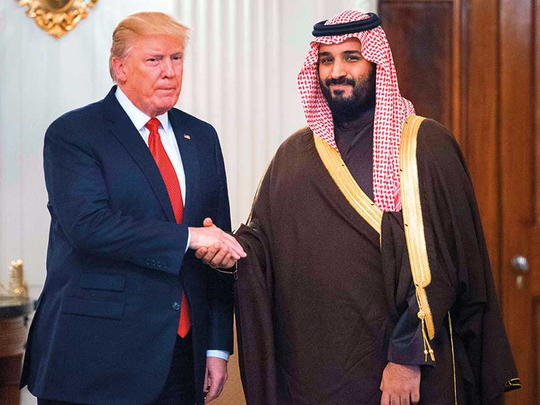
Washingotn: Crown Prince Mohammad Bin Salman arrived in Washington today on a mission.
Mohammad, 32, is the new face of the kingdom, a combination of retail political skills and a youthful drive toward modernity tempered with the religious piety no Saudi leader could survive without.
Less than a year into his tenure, he has moved quickly to stamp out corruption and transform the conservative Saudi culture and diversify the country’s economy.
After meetings with the Trump administration, he will embark on a two-week, coast-to-coast tour of US business and technology centres, hoping to woo new investment and convince Americans that he and his country are modern, worthy partners.
Some of those tasks are likely to be easier than others.
ALSO READ:
• Experts highlight strategic importance of Mohammad’s US visit
• Trump to host Saudi Crown Prince at White House
• Saudi crown prince to visit Iraq
President Donald Trump, who visited the kingdom last spring, has been effusive in his praise of King Salman, lauding their shared efforts against terrorism and antipathy toward Iran as well as massive Saudi purchases of US military equipment.
Close relations
Although Defense Secretary Jim Mattis and outgoing Secretary of State Rex Tillerson made multiple visits to Saudi Arabia last year, and Trump has spoken regularly by phone with Salman and his son, Mohammad is said to have particularly close relations with Jared Kushner, Trump’s son-in-law and a White House adviser.
Kushner, who visited Mohammad last fall in Riyadh, the Saudi capital, will have a private dinner with him during his four-day stay here, according to an administration official.
Trump, who will host the rulers of the UAE and Qatar separately after Mohammad’s departure, hopes to persuade the three to return in May for a summit with him to settle their differences.
Saudi Arabia, Bahrain, the UAE and Egypt severed their ties with Qatar in June of last year accusing it of supporting terrorism and promoting extremist ideology.
“Certainly, we want to see it fixed,” said retired Gen. Anthony Zinni, a former Centcom commander who traveled to the region on the administration’s behalf this month to push for a solution.
“That message comes out loud and clear,” including, he said, from Trump, who initially backed the Saudi move against Qatar.
The administration provides military and intelligence assistance to a Saudi-led coalition fighting Iran-backed Al Houthi militants Yemen.
The White House would like for the conflict to be brought to a negotiated end but is not considering withdrawing its support, according to US officials.
Trump and Mohammad, who is also Saudi Arabia’s defense minister, consider the war a struggle against Iran.
Kushner’s hopes that Saudi Arabia will facilitate his plan to forge an Israeli-Palestinian peace have dimmed since Trump’s recognition of Occupied Jerusalem as the Israeli capital, something senior Arab officials across the region have indicated they cannot accept.
Saudi policy
A senior Saudi official, speaking in advance of Mohammad’s visit, emphasised that Saudi policy remains rooted in a 2002 initiative in which Riyadh and other Arab states said they would normalise relations with Israel in exchange for an independent Palestinian state with East Jerusalem as its capital.
Referring to reports that the Saudis have pressured the Palestinians to accept onerous conditions to placate the administration or shore up a regional coalition against Iran, the official said that “any suggestion that we have linked our position on Palestine to other regional issues is false.”
Counterterrorism, defense, the oil trade, and stemming Iranian influence in the region form the basis of US-Saudi ties, but Riyadh, under Mohammad, has worked to expand its relationships as he moves the kingdom toward Vision 2030, his economic and social modernisation plan.
China has replaced the United States as Saudi Arabia’s main export market.
While US imports of oil, the main Saudi product, have decreased as American domestic production has gone up, the Saudis still hold a trade surplus with the United States.
King Salman, who rarely travels outside the kingdom on official business, visited China and Russia last year, signing economic, security and nuclear energy deals, including a Saudi letter of intent to purchase a Russian antimissile defense system.
China and Russia are contending for contracts to build planned new Saudi nuclear power plants.
US companies would like a major piece of that business, along with placement on the New York Stock Exchange of a planned $100 billion initial public offering by Aramco, the Saudi oil giant.
Both efforts are problematic for the United States, however, in ways that don’t concern Russia and China.
Nuclear enrichment capability
Saudi Arabia would like nuclear enrichment capability as part of the power deal — something that US civil-nuclear arrangements generally prohibit.
Mohammad said in a “60 Minutes” interview broadcast on the eve of his arrival that his country will build a nuclear weapon if Iran does.
At home, Mohammad has generated excitement, particularly among the under-30s who make up nearly two-thirds of the population, by easing some restrictions on culture and entertainment and reining in the authority of the so-called “religious police” who enforced the kingdoms’s ultraconservative norms.
Concerts have been held, and movie theatres are set to open later this month.
For the first time this summer, women will be allowed to drive cars, attend some sporting events and, under certain conditions, join the military, although they still require the permission of a male guardian for many decisions, including to travel abroad.
There are several reasons for Mohammad’s rush to modernity.
With oil prices low and unlikely to provide the endless wealth, “if there are no changes, the kingdom is headed toward disaster,” said Bernard Haykel, a professor of Near Eastern studies at Princeton and frequent visitor to Saudi Arabia who has spent time with the crown prince.
Haykel described Mohammad as an “optimist by temperament,” a pious man who drinks Coke Zero and has the retail political skills of Bill Clinton.
“He shakes hands, he remembers names, he doesn’t talk down to people.”










